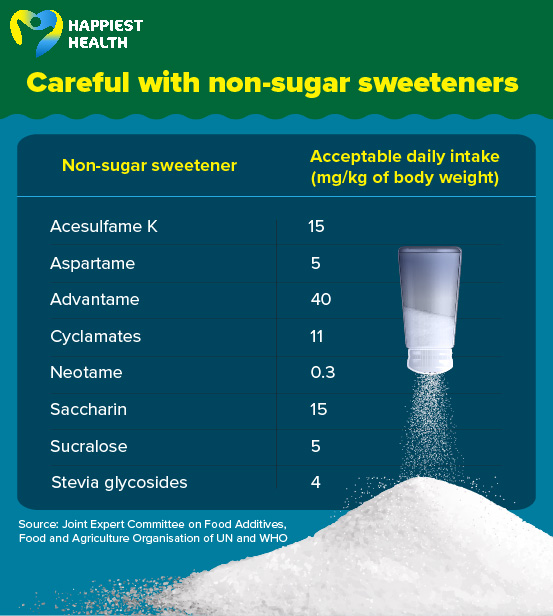
In what could serve as a major influence on global health policymakers, the World Health Organisation (WHO) has issued a fresh conditional guideline urging against the use of non-sugar sweeteners (NSS) or artificial sweeteners for weight control or reducing the risk of noncommunicable diseases (NCDs) like diabetes.
The guideline is also against the popular sugar alternative stevia and its derivatives along with other artificial sweeteners like aspartame and acesulfame K .
These sugar substitutes have been cited as ineffective for weight loss and as posing a higher risk of developing conditions like obesity, type 2 diabetes and cardiovascular complications. Aspartame and acesulfame K , the main sugar substitutes used in ‘diet’ versions of major cola brands including Pepsi and Coke, have also come under the WHO radar.
“Replacing free sugars with NSS does not help with weight control in the long term,” Dr Francesco Branca, director, Nutrition and Food Safety, WHO, Geneva, said in an official statement. “People need to consider other ways to reduce free sugars intake, such as consuming food with naturally occurring sugars, like fruit, or unsweetened food and beverages.”
Dr Banshi Saboo, diabetologist and chair-elect, International Diabetes Federation (IDF), South East Asia, tells Happiest Health that all major soft drinks are loaded with artificial sugars harmful to health.
“Ideally, nobody should add these artificial sweeteners in their diet but unfortunately — because they are used in soft drinks and processed food — lots of people end up consuming them,” says Dr Saboo. “Those without diabetic complications should never opt for them.”
According to WHO, the new guideline is applicable only to non-diabetics and not to people already diagnosed with diabetes and its comorbidities.
The use of saccharine has also been linked to increased risk of bladder cancer, according to the guideline issued on the basis of a systematic review of 283 unique studies, including 45 randomised control trials, 97 prospective cohort studies and 47 case control studies.
The use of NSS during the gestation period has also been associated with a possibility of 25% increase in preterm birth in pregnant women as per some of the studies reviewed before formulating the guideline.
Artificial sweeteners not effective in weight control
The new guideline has debunked theories floated by multiple self-styled weight-loss ‘experts’ who often advocate the use of these NSS as an alternative to natural sugar, citing their low calorie count compared with regular sugar and its derivatives.
Soumita Biswas, Chief Nutritionist, Aster RV Hospital, Bengaluru also confirms that though people with diabetes or obese individuals choose artificial like stevia, aspartame etc as sugar alternatives, it is not exactly helpful in the long run, for weight control and also for managing your diabetes.
“It (artificial sweeteners) could actually increase your craving for more sweet food,” she says.
Biswas also adds that though negative calorie food is recommended for weight loss, these additional craving for sweet food induced by these sweeteners could ultimately have an adverse effect on your weight loss goals.
“When consumed, these artificial sweeteners create an illusion of sugar because of its taste and fool our body to produce more insulin,” says Dr Saboo. “The high insulin secretion in turn leads to increase in appetite and forces us to eat more. So, eventually these artificial sugars increase risk of type 2 diabetes and obesity.”
The WHO guideline confirms that these artificial sweeteners will not lead to weight loss and people should instead resort to early reduction and curtailment of sugar intake to achieve their fitness goals. It adds that people using NSS variants could end up eating more junk and processed food than those who use regular sugar in their food.
Artificial sweeteners and risk of obesity, diabetes
NCDs, including diabetes and cardiovascular diseases (CVDs), were cited as the reason for 41 million out of the total 55 million deaths around the globe in 2019.
The WHO has issued its new guideline along with a warning that cohort or observational studies with a 10-year follow-up period have recorded that a higher intake of NSS led to a high body mass index (BMI) and increase risk of incident obesity. It says observational studies with a 13-year follow-up have also revealed a higher risk of type 2 diabetes, CVDs and mortality from CVDs.

WHO and artificial sweeteners
The WHO guideline encompasses all major NSS variants, including all synthetic and naturally occurring or modified non-nutritive sweeteners that are not classified as sugars found in manufactured foods and beverages, or sold on their own to be added to foods and beverages by consumers.
Aspartame, when digested and absorbed, provides 4 kilocalories per gram and is 200 times sweeter than sucrose (table sugar). However, the amount used to sweeten foods contributes virtually zero calories to the diet and hence can be consumed by diabetics.
Acesulfame is 200 times sweeter than sugar and does not provide any energy as the body cannot digest it. Acesulfame is found in chewing gum, powdered beverages, mixes (like cake, dessert and beverage mixes), non-dairy creamers, etc. Stevia, one of the most popular non-sugar sweeteners, is marketed as a natural alternative sugar since it is derived from the stevia plant.
“NSS are not essential dietary factors and have no nutritional value,” Dr Branca added in his media statement. “People should reduce the sweetness of the diet altogether, starting early in life, to improve their health.”
According to the Coca Cola Company, aspartame is added as a sugar substitute to its major drinks including Coke Zero Sugar, Diet Coke, Fanta Zero, Minute Maid Light and Sprite Zero.
Similar is the case with ‘diet’ beverages brought out by PepsiCo. In 2015, it recalled Diet Pepsi with aspartame and used sucralose as an alternative following allegations of aspartame causing cancer. However, citing ‘public demand’, PepsiCo brought back aspartame within a year.
NSS and health: More research required
The WHO report on non-sugar sweeteners says it is a conditional guideline and further research is required to understand the dynamics of NSS variants on health. It adds that as of now this guideline is an updation of WHO’s earlier stance on NSS consumption and should be used as a reference point for health policymakers according to the prevailing conditions in their respective countries.

















